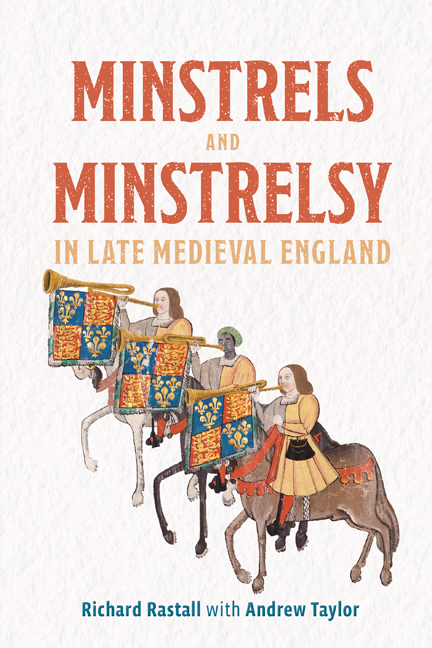Book contents
- Frontmatter
- Dedication
- Contents
- List of illustrations
- List of music examples
- List of abbreviations
- A note on references
- A note on money
- A note on dates
- Preface
- Acknowledgments
- Part I Minstrels and Minstrelsy in the Elite Households
- Part II Urban Minstrelsy
- Part III On the Road
- Part IV Minstrel Performance
- Envoi
- Bibliography
- Index
7 - Civic minstrels
Published online by Cambridge University Press: 09 January 2024
- Frontmatter
- Dedication
- Contents
- List of illustrations
- List of music examples
- List of abbreviations
- A note on references
- A note on money
- A note on dates
- Preface
- Acknowledgments
- Part I Minstrels and Minstrelsy in the Elite Households
- Part II Urban Minstrelsy
- Part III On the Road
- Part IV Minstrel Performance
- Envoi
- Bibliography
- Index
Summary
Town minstrels in England and abroad
The position of town minstrels, the reasons for their employment and the way in which they were developed varied widely in Europe, and to some extent in England and Scotland. For historical reasons it is useful to consider their position in late medieval Flanders and France before considering the situation in England. While no two towns worked in exactly the same way, the broad outlines of civic security and musical entertainment can be seen.
Many towns in France and Flanders had a bell-tower from which the surrounding countryside could be viewed, and this enabled the performance of several duties. First, because bells could be heard all over the town they could be rung to signal the opening and closing of the town gates at the beginning and end of the day. Second, a watchman could give warning of the approach of an enemy force against which the gates must be closed or of the train of an important personage who must be welcomed; he could also look out for fires at night, very necessary in an age when buildings were largely made of timber and candles or rush lights were the normal lighting. Third, it would be possible to mark certain hours of the day, an important function that could be combined with that of entertaining the citizens with music. Towns therefore employed a watchman – guet in French – who could fulfill, or initiate action towards, these various functions.
This guet did not have to play a musical instrument if bells were used for signalling purposes, but almost everywhere he played some lip-reed instrument. This was at least an animal horn: but easily the most common was a trumpet, occasionally an inexpensive one, sometimes even a valuable silver one, with the guet being known as the city trumpeter. If he were competent as a musician there were also ceremonial functions for which he could be employed. During the fourteenth and fifteenth centuries some of the more wealthy northern towns in the Flemish orbit added shawmists (usually three) to the trumpeter, forming a standard four-man band.
- Type
- Chapter
- Information
- Minstrels and Minstrelsy in Late Medieval England , pp. 146 - 162Publisher: Boydell & BrewerPrint publication year: 2023



